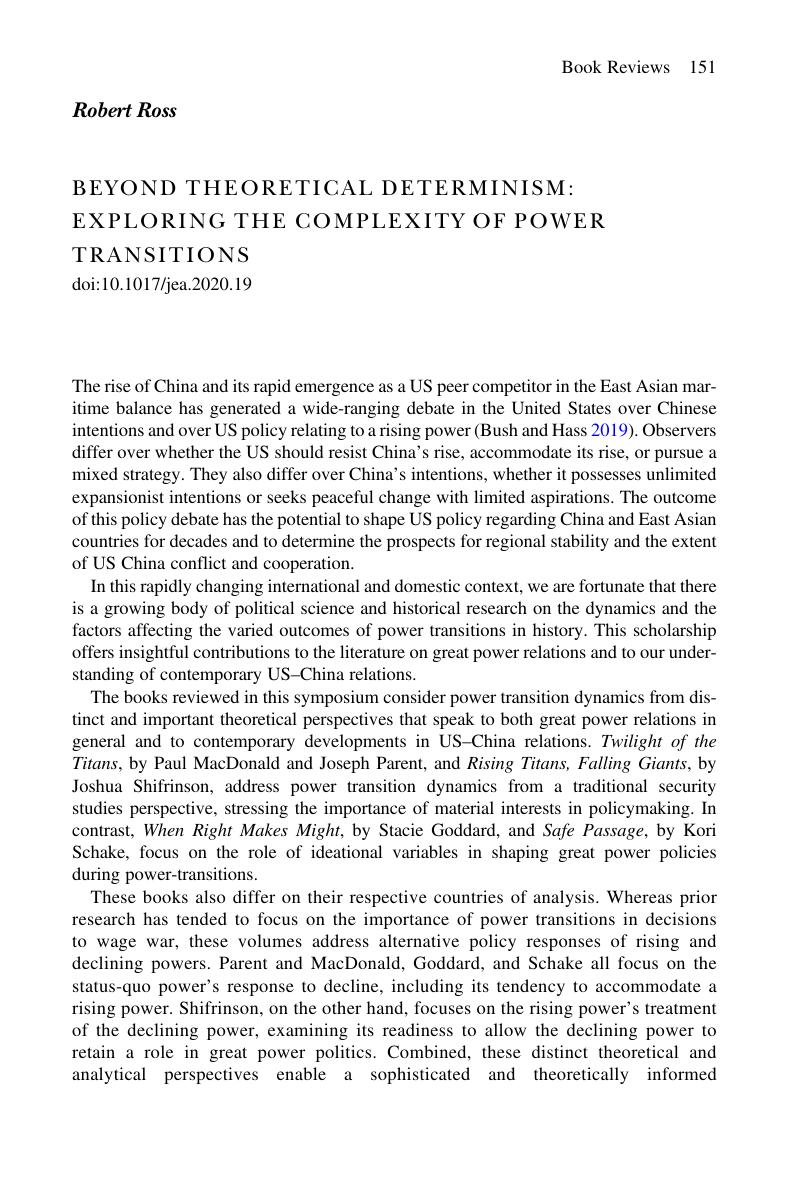No CrossRef data available.
Article contents
BEYOND THEORETICAL DETERMINISM: EXPLORING THE COMPLEXITY OF POWER TRANSITIONS
Published online by Cambridge University Press: 19 August 2020
Abstract
An abstract is not available for this content so a preview has been provided. Please use the Get access link above for information on how to access this content.

- Type
- A Book Reviews Roundtable
- Information
- Copyright
- Copyright © East Asia Institute 2020
References
REFERENCES
Blagden, David W., Levy, Jack S., and Thompson, William R.. 2011. “Correspondence: Sea Powers, Continental Powers, and Balancing Theory.” International Security 36 (2): 190–202.CrossRefGoogle Scholar
Bush, Richard C., and Hass, Ryan. 2019. “The China Debate Is Here to Stay.” Washington: Brookings Institution. www.brookings.edu/blog/order-from-chaos/2019/03/04/the-china-debate-is-here-to-stay/.Google Scholar
Congressional Budget Office. 2015. “An Analysis of the Navy's Fiscal Year 2016 Shipbuilding Plan.” www.cbo.gov/publication/50926.Google Scholar
Congressional Research Service. 2019. “China Naval Modernization: Implications for U.S. Navy Capabilities—Background and Issues for Congress.” RL33153.Google Scholar
Friedberg, Aaron L. 1987. “Britain and the Experience of Relative Decline, 1895–1905.” Journal of Strategic Studies 10 (3): 331–362.CrossRefGoogle Scholar
Goddard, Stacie. 2018. When Right Makes Might: Rising Powers and World Order. Ithaca: Cornell University Press.Google Scholar
Jervis, Robert. 1970. The Logic of Images in International Relations. Princeton: Princeton University Press.Google Scholar
Layne, Christopher. 2008. “Security Studies and the Use of History: Neville Chamberlain's Grand Strategy Revisited.” Security Studies 17 (3): 397–437.CrossRefGoogle Scholar
Levy, Jack S. 1985. “Theories of General War.” World Politics 37 (3): 344–374.CrossRefGoogle Scholar
Levy, Jack S. 1987. “Declining Power and the Preventive Motivation for War.” World Politics 40 (1): 82–107.CrossRefGoogle Scholar
MacDonald, Paul K., and Parent, Joseph M.. 2018. Twilight of the Titans: Great Power Decline and Retrenchment. Ithaca: Cornell University Press.Google Scholar
Medeiros, Evan S. 2019. “China Reacts: Assessing Beijing's Response to Trump's New China Strategy.” China Leadership Monitor, Issue 59, March 1.Google Scholar
Owen, John M. 1994. “How Liberalism Produces Democratic Peace.” International Security 19 (2): 87–125.CrossRefGoogle Scholar
Ripsman, Norrin M., and Levy, Jack S.. 2008. “Wishful Thinking or Buying Time? The Logic of British Appeasement in the 1930s.” International Security 33 (2): 148–181.CrossRefGoogle Scholar
Schake, Kori. 2017. Safe Passage: The Transition from British to American Hegemony. Cambridge, MA: Harvard University Press.CrossRefGoogle Scholar
Segal, Adam. 2019. Innovation and National Security: Keeping Our Edge. New York: Council on Foreign Relations.Google Scholar
Shifrinson, Joshua R. 2018. Rising Titans, Falling Giants: How Great Powers Exploit Power Shifts. Ithaca: Cornell University Press.Google Scholar
Tunsjø, Øystein. 2018. The Return of Bipolarity in World Politics: China, the United States, and Geostructural Realism. New York: Columbia University Press.CrossRefGoogle Scholar
Yongping, Feng. 2006. “The Peaceful Transition of Power from the UK to the US.” The Chinese Journal of International Politics 1 (1): 83–108.CrossRefGoogle Scholar



